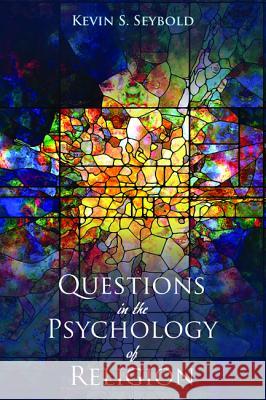Questions in the Psychology of Religion » książka
Questions in the Psychology of Religion
ISBN-13: 9781498238816 / Angielski / Miękka / 2017 / 240 str.
Questions in the Psychology of Religion
ISBN-13: 9781498238816 / Angielski / Miękka / 2017 / 240 str.
(netto: 113,77 VAT: 5%)
Najniższa cena z 30 dni: 117,83
ok. 16-18 dni roboczych.
Darmowa dostawa!
What does it means to be human? What is the origin of religious beliefs? Why are we moral creatures? Are religious experiences different from our everyday experiences? Is my brain involved in my experiencing God? What is a soul and do I have one? Is religion a result of evolutionary processes? How might psychology and religion relate? Religious experiences (behaviors, thoughts, and emotions) are determined, at least in part, by natural physical processes. As a result, the empirical methods used in psychology to try to identify the natural mechanisms that influence why we act, think, and feel the way we do can provide important insights into the fundamental and universal phenomena of religion. Drawing on current research from a variety of disciplines, Questions in the Psychology of Religion is appropriate for college students studying psychology, pastors as they help their congregations understand how religion and science might go together, and anyone who learns about recent discoveries in psychological science and wonders how these findings pertain to religion and religious experiences. ""Willing to consider what we can learn from evolutionary theory, cognitive science, and neuroscience, Kevin Seybold is not afraid to tackle such tough questions as what is morality, where do my religious beliefs come from, and why Christians can differ on such social issues as immigration or gay marriage. Neither a theological apologetic nor critique, Seybold convincingly provides a look at religious faith that many Christians quite simply have not considered before. Well worth the read."" --Peter C. Hill, Professor of Psychology, Biola University; Editor, Journal of Psychology and Christianity ""Even as the religious landscape is changing across America, there are fresh insights daily being gained through research targeting 'the hard questions' of what is the nature of human consciousness and what is the basis for morality, religiosity, and empathy. Dr. Seybold's compelling text navigates this critical terrain, offering compelling reflections on the cognitive science of religion grounded in the latest research and theories of psychological science."" --Randall Bush, Senior Pastor, East Liberty Presbyterian Church, Pittsburgh, PA ""If you have ever wondered whether religion is 'all in the brain' or whether the soul is real, this book will help you explore how psychologists study these and related fascinating questions. Seybold not only guides readers through the research, he also provides tools for a thoughtful critique, enabling readers to take seriously both the science and their faith. Undergraduate students and the intellectually engaged general public will find this an engaging and provocative read."" --Heather Looy, PhD, Professor of Psychology, The King's University, Edmonton, AB Kevin S. Seybold is Professor of Psychology at Grove City College in Pennsylvania. He has published articles in the areas of physiological psychology, cognitive science, and neuroscience. He is the author of Explorations in Neuroscience, Psychology and Religion (2007).
What does it means to be human? What is the origin of religious beliefs? Why are we moral creatures? Are religious experiences different from our everyday experiences? Is my brain involved in my experiencing God? What is a soul and do I have one? Is religion a result of evolutionary processes? How might psychology and religion relate?Religious experiences (behaviors, thoughts, and emotions) are determined, at least in part, by natural physical processes. As a result, the empirical methods used in psychology to try to identify the natural mechanisms that influence why we act, think, and feel the way we do can provide important insights into the fundamental and universal phenomena of religion. Drawing on current research from a variety of disciplines, Questions in the Psychology of Religion is appropriate for college students studying psychology, pastors as they help their congregations understand how religion and science might go together, and anyone who learns about recent discoveries in psychological science and wonders how these findings pertain to religion and religious experiences.""Willing to consider what we can learn from evolutionary theory, cognitive science, and neuroscience, Kevin Seybold is not afraid to tackle such tough questions as what is morality, where do my religious beliefs come from, and why Christians can differ on such social issues as immigration or gay marriage. Neither a theological apologetic nor critique, Seybold convincingly provides a look at religious faith that many Christians quite simply have not considered before. Well worth the read.""--Peter C. Hill, Professor of Psychology, Biola University; Editor, Journal of Psychology and Christianity""Even as the religious landscape is changing across America, there are fresh insights daily being gained through research targeting the hard questions of what is the nature of human consciousness and what is the basis for morality, religiosity, and empathy. Dr. Seybolds compelling text navigates this critical terrain, offering compelling reflections on the cognitive science of religion grounded in the latest research and theories of psychological science."" --Randall Bush, Senior Pastor, East Liberty Presbyterian Church, Pittsburgh, PA""If you have ever wondered whether religion is all in the brain or whether the soul is real, this book will help you explore how psychologists study these and related fascinating questions. Seybold not only guides readers through the research, he also provides tools for a thoughtful critique, enabling readers to take seriously both the science and their faith. Undergraduate students and the intellectually engaged general public will find this an engaging and provocative read.""--Heather Looy, PhD, Professor of Psychology, The Kings University, Edmonton, ABKevin S. Seybold is Professor of Psychology at Grove City College in Pennsylvania. He has published articles in the areas of physiological psychology, cognitive science, and neuroscience. He is the author of Explorations in Neuroscience, Psychology and Religion (2007).











